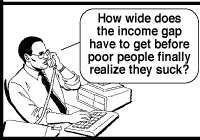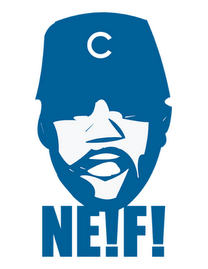Mister Maverick, Meet Da Machine
By THOMAS FRANK
...True, there is a clique of professors in Hyde Park who are "alien" to working-class interests, as I know from having lived there for 15 years. Those professors are conservatives, however: members of the University of Chicago's law and economics departments who have given that institution much of its world-wide fame.
Their hostility to the working class is not to be doubted. They have dreamed up ways to get the New Deal ruled unconstitutional. They have railed against labor unions and higher minimum wages while cheering lustily for Nafta and grotesque pay inequality. At this very moment, in that diabolical neighborhood of Hyde Park, the university is setting up a lavishly funded Milton Friedman Institute in order to better worship the greatest free-market evangelist of them all. (Fittingly, it will occupy what used to be the Chicago Theological Seminary.)
But these professors get a pass when Hyde Park's "academic world" comes under fire. These are intellectuals conservatives love; indeed, if the GOP ever was the "party of ideas," as many insist, those ideas pretty much came from Hyde Park.
What the culture warriors mean is something much cruder: that the neighborhood of Hyde Park (1) harbors a lot of academic types and (2) has a very liberal political tradition. Stereotype, meet cliché: Professors plus liberalism equals "elitism."
Maybe it will work. But first our Republican friends should know something about the company they are keeping as they line up with the neighborhood's detractors.
The distinguishing characteristic of Hyde Park's political history – the feature that sets it apart from every other neighborhood in the city – is its longstanding defiance of the Chicago machine.
Over the years, the neighborhood stubbornly insisted on sending a series of independents and clean-government types to be its representatives in Congress and on the City Council. They have included alderman Leon Despres, who fought the machine for years; mayor Harold Washington, who finally beat the machine; and Sen. Paul Douglas, whose endless battles against corruption won him the appellation – yes – "maverick."
The machine hated them right back. It gerrymandered Hyde Park to dilute the neighborhood's vote; it routinely shut off Mr. Despres's microphone when he spoke in the City Council. Abner Mikva, whom Hyde Park sent to Congress in the 1970s (he is now an informal adviser to Mr. Obama), later wrote of his own introduction to the Chicago machine when he tried to volunteer in 1948:
"'Who sent you?' the committeeman said. I said, 'Nobody.' He said, 'We don't want nobody nobody sent. . . . Where are you from, anyway?' I said, 'University of Chicago.' He said, 'We don't want nobody from the University of Chicago in this organization.'"
And now, 60 years later, comes John McCain to embrace the same noble sentiment. Apparently he has seen a glimmer of promise in that stale hate and is ready to pick up where the machine left off. Some maverick.
Then again, why shouldn't he? His party embodies the motto of Chicago politics – "Where's mine?" – even better than the machine's patronage army did 50 years ago.
Wanting to be sure, I contacted the McCain campaign with an email query addressed to two officers, which unfortunately bounced back. But I also emailed Mark Salter, the candidate's right-hand man. Mr. Salter replied in under a minute, both to the others I had addressed and, considerately, to me as well: "Do not respond," he ordered.
But I will respond anyway. Here is my advice to Mr. Salter, as he travels about burnishing his boss's image as a "maverick" who is unafraid to talk to the press. If you're going to drum up some Chicago-style hate, you need to learn some authentic Chicagoese. Next time you brush off a reporter, do it right. Repeat after me: "We don't want nobody nobody sent."
Subscribe to:
Post Comments (Atom)





















1 comment:
This is not the Wall Street Journal we knew. It is puzzling. It is sad.
Post a Comment